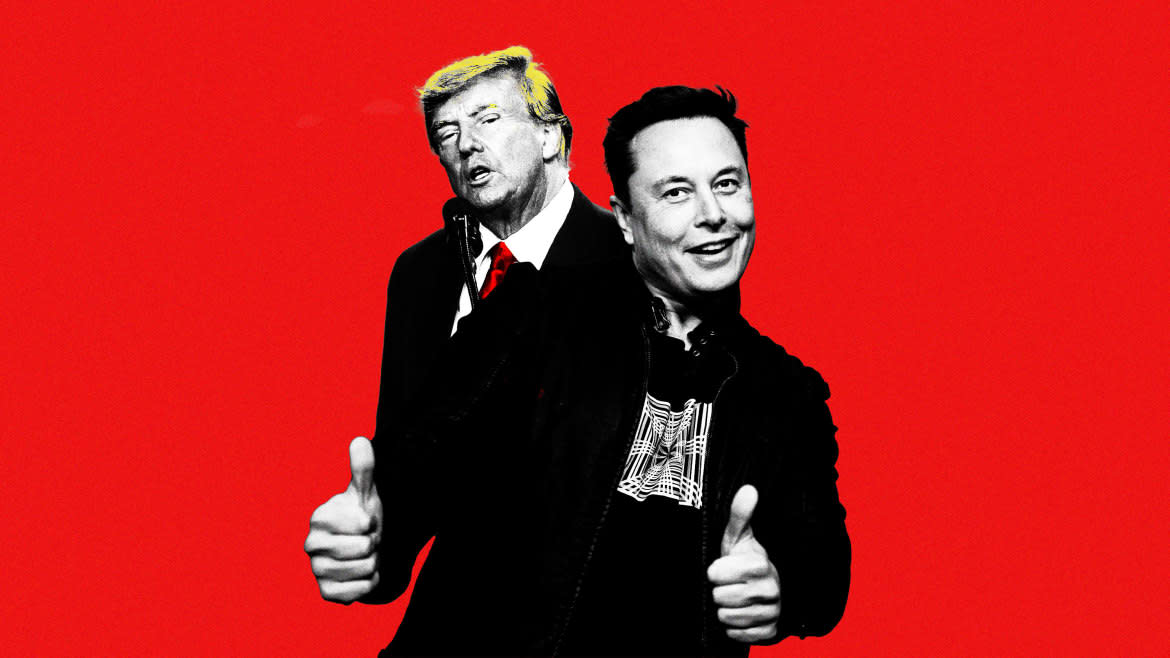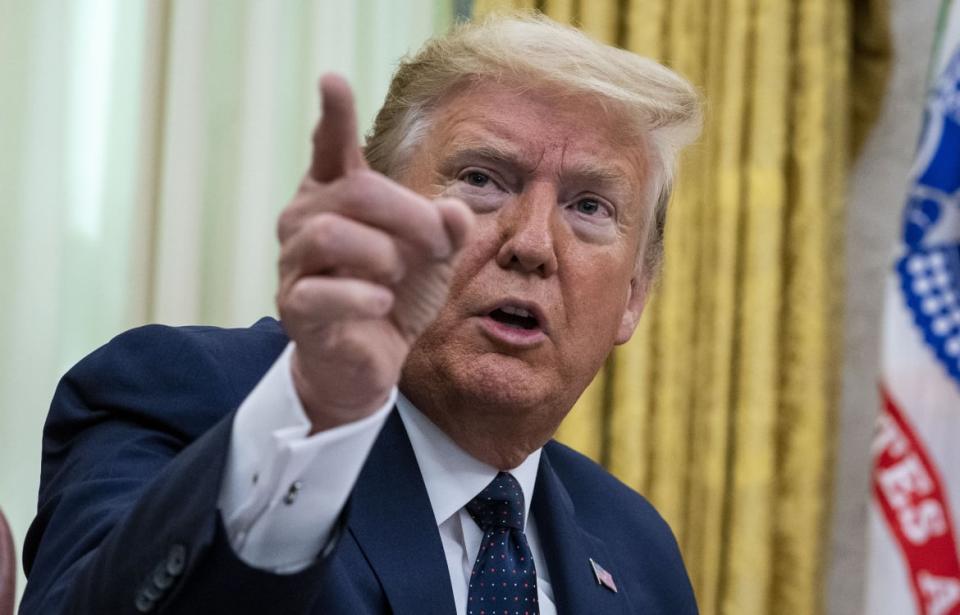Why Elon Musk Fought a Federal Search Warrant to Help Trump

Forget the purported MMA cage match between Meta founder Mark Zuckerberg and Elon Musk, the owner of the social media company formerly known as Twitter, now known as X. The real action is the fight between Musk and Special Counsel Jack Smith over former President Donald Trump’s Twitter account—which took place in secret for months.
Musk was ultimately forced to submit to the search warrant, and also had to pay hundreds of thousands in court-ordered fines.
According to a just unsealed D.C. Circuit Court of Appeals opinion, the special counsel obtained a court-approved search warrant for Trump’s @RealDonald Trump Twitter account in January 2023 as part of the investigation into Trump’s efforts to overturn the 2020 election—but Twitter fought a court battle arguing it had a First Amendment right to tell Trump about the search warrant.
The Hidden Messages in the New Trump Indictment
As is common in law enforcement investigations, the warrant was accompanied by a non-disclosure order which required Twitter to refrain from telling the subject of the search—Trump—about the existence of the warrant, so as to guard against potential destruction of evidence.
Twitter challenged the constitutionality of the order, arguing that it had a First Amendment right to tell Trump about the warrant.
Federal district court Judge Beryl Howell disagreed with Twitter’s argument, but agreed with Smith’s team that there were “reasonable grounds to believe” that telling Trump “would seriously jeopardize the ongoing investigation” by allowing him a chance to “destroy evidence, change patterns of behavior [or] notify confederates.”
Initially, the government also claimed that another reason to keep the warrant a secret from Trump was the risk that he might flee the country, but the government later retracted that reason, saying it had been mistakenly included. Tellingly, the court agreed with this reason, as well, before the prosecutors retracted it as a mistake.

Special Counsel Jack Smith delivers remarks on a recently unsealed indictment including four felony counts against former President Donald Trump at the Justice Department on August 1, 2023 in Washington, D.C.
Twitter’s legal performance was also telling. In an astounding display of ineptitude, Twitter’s online portal through which law enforcement requests are made was not working when prosecutors sought to serve the search warrant.
While perhaps to be expected given Musk’s layoffs of staff and decimation of Twitter’s legal department—including his firing of Twitter’s chief legal officer and general counsel within hours of buying Twitter, and then later removing the lawyer he had picked to replace them—it is still astounding that a major social media company would display this kind of technical incompetence, given the volume of law enforcement requests.
For example, in just the first half of 2020, Meta—then known as Facebook—received 61,500 law enforcement requests for data, Google received 39,500, and Microsoft received 5,500. These requests included both search warrants, as well as subpoenas.
When Twitter’s online portal did finally start working, the government served the warrant, but several days later Twitter’s legal counsel told the government they were unaware of the warrant. Twitter did not legally challenge the search warrant until four days after the deadline for production had expired. Accordingly, Judge Howell imposed contempt fines of $50,000 per each day of lateness, doubling with each succeeding day and ultimately piling up to $350,000.
Twitter’s legal objection was also unusual because in the vast majority of law enforcement requests, major social media companies comply (Meta/Facebook complied with 89 percent of search warrant requests; Google complied with 83 percent of requests—with 39% of those being search warrants).
Social media companies do contest some of these requests based on the scope of the requests and/or whether law enforcement has proper authority for the requests, but Twitter went to court because it wanted to tell Trump about the request despite the court-ordered secrecy.
Elon Musk, Joe Rogan, and the Apocalyptic ‘Centrists’
As befitting Musk’s proclamation that he is a First Amendment absolutist, Twitter claimed that being denied its desire to snitch on the search warrant to Trump was a violation of its First Amendment free speech rights. Judge Howell rejected that argument, as well as a request to stay compliance with the warrant pending litigation. The D.C. Circuit Court of Appeals agreed with Judge Howell.
Writing for a unanimous panel, appeals court Judge Florence Pan rejected Twitter’s assertion that the failure to provide a stay was unconstitutional and put down the legal argument as “underdeveloped.” Twitter’s other arguments included saying that it needed to tell Trump about the warrant so that Trump could raise executive privilege arguments.
The executive privilege argument seems particularly bogus, given that executive privilege is a doctrine meant to protect the president’s confidential discussions with advisors from public scrutiny. Thus, Musk appears to argue that Trump could be getting confidential advice from his social media account with millions of followers.

U.S. President Donald Trump speaks in the Oval Office before signing an executive order related to regulating social media on May 28, 2020 in Washington, D.C.
But using the First Amendment as a go-to weapon is now a typical tactic by the conservative right. For example, the recent U.S. Supreme Court decision in 303 Creative LLC v. Elenis held that a wedding website planner could refuse to design websites for gay couples based on the First Amendment speech rights for businesses.
Ultimately, the prosecution modified its position on disclosure to allow Twitter to let Trump know, but with an important exception: the name of the agent making the affidavit in support of the warrant had to be kept confidential. This protection was well warranted in light of the threats and harassment that Trump and his supporters have directed against anyone deemed as an enemy of Trump—for example, the Georgia election workers falsely accused of engaging in election fraud.
The necessity of such protections was confirmed as Trump blasted out his anger over the warrant on his Truth Social account, baselessly claiming that the search warrant was a means for President Joe Biden to attack his candidacy.
Trump Was Indicted for Being Wrong—Which Is Not a Crime
The legitimate reasons for obtaining a court-approved search warrant for Trump’s account are many. They include the simple evidentiary requirement that any evidence provided by his tweets regarding his state of mind about the 2020 election would need to be admitted through evidence obtained from the account itself—to show integrity of the evidence.
It is also possible that less-public information contained in direct messages and metadata could have further investigative value not yet known publicly. In contrast, Twitter’s obstructionist position, now twice rejected by both the trial and appellate courts, seems baseless.
When Musk took Twitter private he gained the ability to shape the social media platform’s policies to his own personal predilections. The fight over access to Trump’s account tells a lot about how those, as well as how the company is being run under Musk’s stewardship.
And that is far more revealing—and more troubling—than any MMA fight showcasing how “White Billionaires Can’t Fight.” What the formerly secret Twitter fight over Trump’s account shows is just what one white billionaire wants to fight about.
Get the Daily Beast's biggest scoops and scandals delivered right to your inbox. Sign up now.
Stay informed and gain unlimited access to the Daily Beast's unmatched reporting. Subscribe now.

 Yahoo News
Yahoo News 
